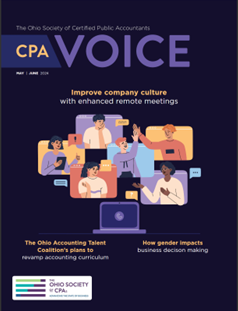CPA VOICE: The ethics of burnout

Ideally, we should block or prevent burnout from happening since it often leads to work paralysis where an individual cannot work any further due to symptoms such as fatigue, pain, sickness, decreased motivation, anxiety, depression, disillusionment, and strained interpersonal relationships.
Notably, our efforts to address burnout are closely tied to ethics because they highlight the values and principles that emphasize the rights of individuals. These rights are essential to preserving well-being and job satisfaction. When you think about the fraud diamond theory, people are more likely to cut corners and engage in unethical behavior when they are under pressure.
Find tips for preventing and addressing burnout in the May/June issue of CPA Voice.
